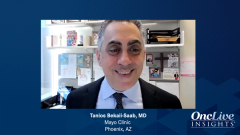
Future Directions: Optimizing Care Through Combinations
Tanios S. Bekaii-Saab, MD, describes the future direct of clinical research into immune check point inhibitors for solid tumors, which he believes will be to explore additional combinations with targeted therapies.
Episodes in this series

Transcript:
Tanios S. Bekaii-Saab, MD: In the future we will have to think about the complexities of the cancer cell and its microenvironment. Targeting a cancer with very specific agents that home in on 1 target is not cutting it for most patients. The reason for this is that there are very few cancers where we know the specific driver, and there’s only 1 driver taking us into the path. Blocking 1 target may induce a response, but these responses tend to be fleeting and not necessarily durable. In that sense, it’s important to continue these considerations about monoclonal antibodies—inhibiting VEGF or others—and how to optimize their activities and combine them with multikinase inhibitors that work on the cells and the microenvironment. A number of multikinase inhibitors are being developed that appear to have more favorable pharmacokinetic profiles. They will likely have less hepatotoxicity, at least theoretically, based on their improved pharmacokinetic profile.
These will offer improved outcomes for patients and safer administration to patients, but they’ll be easier and safer to combine with a lot of the agents we have on hand, whether immune checkpoint inhibitors, VEGF inhibitors, or others. We’re learning quite a bit. Meanwhile, it’s very important to understand that with these multikinase inhibitors on hand, the risk of hepatotoxicity is there. It’s not overwhelming, but it’s there, and close monitoring is our best tool to prevent complications and the rare event of liver failure. Acting early, switching, reducing the dose, starting low and going slowly higher, as we do with regorafenib and others—these are mitigating factors to improve outcomes and ensure that our patients are able to navigate a very treacherous terrain with safety and optimize their outcomes. This means prolonging their survivals, improving their responses, and finding our way toward a cure, even in the more advanced settings.
Transcript edited for clarity.






































